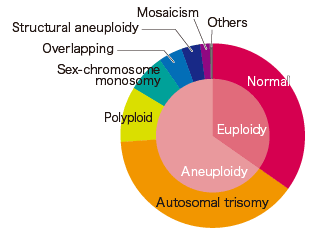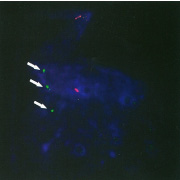
"Preimplantation genetic diagnosis (PGD)" is a technique that examines the chromosomes of fertilized oocytes that have undergone microinsemination (ICSI) to check for abnormalities.
Prenatal diagnosis attempts to discover the presence or absence of abnormalities in a baby before birth, such as by amniocentesis or ultrasonography.
Because the test is done after pregnancy is established, if you find any abnormalities, you will be forced to make a difficult choice between giving birth and not giving birth.
Preimplantation genetic diagnosis, on the other hand, can tell if a fertilized oocyte has a chromosomal abnormality, so when returning the fertilized oocyte to the uterus (embryo transfer), it is possible to select a fertilized oocyte that is unlikely to have a miscarriage or stillbirth.
Currently, in Japan, preimplantation genetic diagnosis for people with severe hereditary diseases is permitted under the guidelines of the Japan Society of Obstetrics and Gynecology.
There is also a screening test called "preimplantation genetic screening (PGS)" that uses the same technique as preimplantation genetic diagnosis (PGD).
Preimplantation genetic diagnosis (PGD) is aimed at examining specific chromosomal or genetic abnormalities in fertilized oocytes in couples with known severe hereditary diseases, whereas PGS takes a broader, more general look at chromosomal makeup to reduce the chance of miscarriage by selecting an embryo with normal chromosome numbers.
PGS is developed to reduce the physical and mental burden on women by examining fertilized oocytes for abnormalities before pregnancy is established.
Overseas, pre-implantation screening is carried out in many countries such as the United States, United Kingdom, France, Scandinavia, Russia, Turkey, Argentina, China, South Korea, India and Thailand. In Japan, pre-implantation screening is not permitted according to the guidelines of the Japanese Society of Obstetrics and Gynecology.
However, in February 2015, the Japanese Society of Obstetrics and Gynecology approved a three-year clinical research plan, and it is possible that pre-implantation screening will be conducted in the field of infertility treatment in the future.
If a fertilized oocyte has a chromosomal abnormality, it usually cannot implant, or if it does implant, it may cause miscarriage or stillbirth.
When miscarriages are analyzed, many abnormalities are seen that could be diagnosed by PGS. American research institute report that pre-implantation screening improves the implantation rate and reduces the rate of miscarriage substantially, especially in patients with recurrent pregnancy loss.
Repeated miscarriages increase the chances of damaging the uterus and causing uterine adhesions.
Uterine adhesions can lead to problems during pregnancy and childbirth, such as impeding implantation, increasing the likelihood of miscarriage, or placenta accreta bleeding.
Preimplantation genetic diagnosis and preimplantation screening can prevent miscarriage, prevent uterine adhesions, and reduce problems during pregnancy and childbirth.

Maribel Grande: Created at the Orc Society based on Human Reproduction Vol.0 no.0 pp.1-9,2012

Anver Kulviev, Svetlana Rechitsky and Oleg Verlinsky : ATLAS OF PREIMPLANTATION GENETIC DIAGNOSIS THIRD EDITION :
CRC Press
This page provides general information on preimplantation genetic diagnosis only.